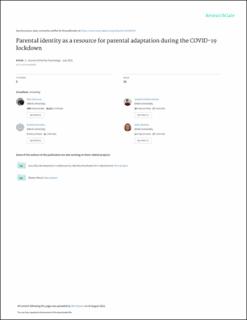| dc.description.abstract | The lockdown measures that were taken to contain the worldwide outbreak of COVID-19 caused many parents to stay at home with their children. This unusual situation created both risks and opportunities for families. In the present study, we examined the role of parental identity as a resource for parental adaptation during this challenging period, thereby considering both parenthood experiences and parents’ general mental health while also taking into account the cumulative risk to which parents were exposed (e.g., single parenthood). Furthermore, to shed light on the mechanisms behind the effects of parental identity, this study addressed the mediating role of parental satisfaction of their basic psychological needs for autonomy, competence, and relatedness. During the lockdown period in Belgium, 492 parents (88% mothers, Mage = 44 years, 63.7% in intact family, 31.2% with a university degree) completed online questionnaires on parental identity, need-based experiences, positive and negative parenthood experiences, and mental health. Several weeks earlier, these participants also rated their mental health and a variety of risks they were exposed to as part of a larger study. Results showed that a clear and self-endorsed parental identity was related to better parental adaptation, with parental need satisfaction playing a mediating role in these associations. Moreover, these associations remained significant after controlling for the prior levels of parental mental health and for cumulative risk. Overall, findings suggest that parental identity serves as a source of resilience in an uncertain period such as the COVID-19 pandemic. Practical implications and directions for future research are discussed. | en_US |
